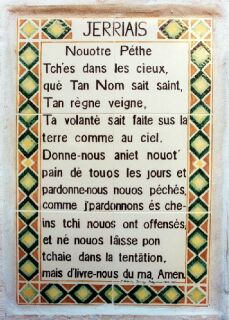
Dans l'Couvent du Pater à Jérusalem


The difficulty in providing what might be styled en "authorised version" of the Lord's Prayer in Jèrriais was the convention that the language was inferior to "lé bouôn Français", or "lé Haut Français", although, of course, the Island vernacular stemmed from one of the Gallo-Roman regional languages that contributed much to the formation of standardised French. So it was the fashion here for home prayers, including the Grace, as well as church services to be in French, although some Methodist local preachers would enunciate with a Jersey accent.
Dr. Frank Le Maistre was the author of "Notre Père", published in 1972 on page 50 of Volume 4, Numbers 5 and 6, of Lé Bulletin d'Quart d'An dé L'Assembliée d'Jérriais. However. even this starts off with "Notre Père" within inverted commas, with a footnote to the effect that one said these first two words in French. This convention now being outdated, we see no reason why they should not now be in Jèrriais. We therefore suggest that these be changed and that there be a few other minor adjustments, such as only retaining one subjunctive "Qué" and adding "et" between "touos les jours" and "pardonne-nous nouos péchés", as this should flow as in French and English. Otherwise, the version is entirely Dr. Le Maistre's, although the prayer itself is not a particularly good vehicle for demonstrating the distinctive nature of the Island's ancient tongue.
ML
|
Nouotre Péthe
Nouotre péthe, tch'es dans les cieux,
Âmen |
Further reading: